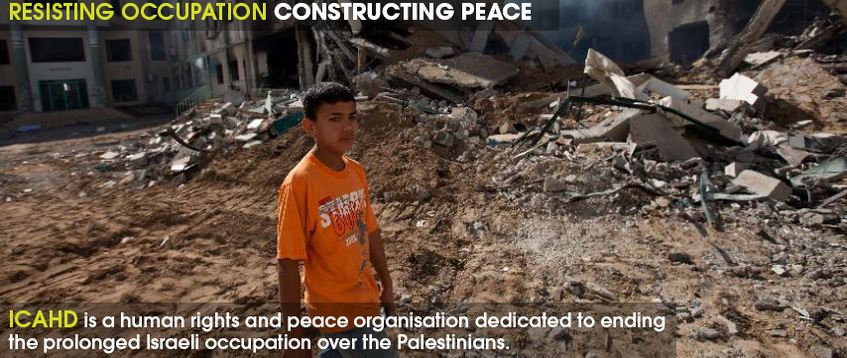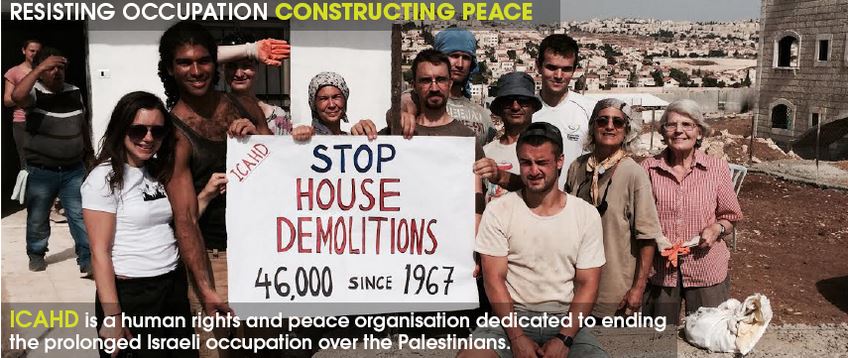End Occupation and Stop Demolitions of Palestinian Homes: Interview with ICAHD
By Denise Nanni and Milena Rampoldi, ProMosaik. In the
following our interview mit Chaska Katz of ICAHD,
the Israeli Committee Against House
Demolitions. The continuous demolition of Palestinians homes is part of the
Israeli colonialism and of the continuation of the Nakba of 1948 and must be
stopped urgently. ICAHD opposes to house demolitions by the Israeli State
because they violate basic human rights of the Palestinians. Palestinians are
deprivated of their homes in their homeland. And this is something we have to
strongly oppose. We have to raise our voice against Israeli occupation, and
against house demolitions, which is an aspect of this colonialist occupation of
Palestinian land.

How has civil society been responsive to your
initiatives so far?
hands” of the Palestinian issue. It has become virtually a non-issue in
Israel. The status quo is fine with Israeli Jews, the political and security
situation is quiet, Trump is coming into office, no one is interfering with the
settlement enterprise (despite the UN vote), the economy is doing well (for a
neoliberal economy, who cares about the poor?), and the Palestinians have been
confined to their little islands of Areas A and B and Gaza, and have virtually
“disappeared” from Israeli view. That is why ICAHD focuses on
the international civil society, for whom Palestine is still a major
issue.
Which are the most effective strategies in order to
promote tolerance and democratic values among different communities?
cannot work without a political and economic situation that ensures equal
rights to everyone. Attempts to “dialogue” among groups or programs
to “teach tolerance” or “promote inter-cultural
understanding” do not work unless the power relationships are addressed.
The problem isn’t a lack of tolerance and democratic values; it is the inequality
that exists that makes one group discriminate against others and generate
hatred and fear in order to maintain its dominance over them. So first equal
social, political and economic rights — which is hard in Israel because it is
built on Jewish dominance and political exclusivity — and then the process of
reconciliation and co-existence, when everyone can genuinely have their
narratives and also pursue their lives in genuine equality.

awareness about Palestinians issues and rights in ISRAEL?
society. Our view is that peace will not come from within Israel, that Israeli
Jews have no motivation to seek a just peace, and that the Left in Israel, like
the Palestinians, have no political influence. Again, we also believe that
problems of tolerance and co-existence will work themselves out under
conditions of political equality, when racism and discrimination have lost
their point. The problem isn’t racism and intolerance, its structured
inequality in which racism and intolerance play a useful role in maintaining
the dominance of some groups over others. It is a political and economic
problem — the result of inequality — not one of values.
your activity and what is the current situation in those areas?
the agenda: resolving the Israeli-Palestinian conflict (or Israeli colonialism,
to be more exact), an absolute pre-condition for any kind of normal life here.
To do that we have to mobilize the international civil society and governments
— which we, together with our partners in Israel, Palestine and abroad, have
done effectively — but then give them direction, which we have failed to do.
We can’t liberate Palestine from abroad. The struggle — and the solution, the
end-game — have to come from Palestinians, supported by Israelis. Our primary
task, therefore, is to sit down with our Palestinian partners and hammer out a
political program, and end-game. Then we can turn the different kinds of
mobilization we have today (expressed mainly through BDS) into a pro-active and
effective force for actually resolving the conflict.

In which way do you cooperate with the ECOSOC and what
are the most effective ways through which people from around the world can
support you?
in Geneva and to do joint presentations with our Palestinian partners. But the
UN is very limited, and is not the best forum for genuine political work. So we
have established direct contacts with civil society organizations — and some
government officials — abroad. We mobilize and inform them through speaking
tours, the publication of books, articles, maps, films and informational
materials, tours of the “facts on the ground” in the OPT, joint
campaigns with ICAHD branches abroad and many others, participation in ECOSOC
and in international conferences, and other ways in moving our critical
analysis and grassroots peace-making ahead.
(“us” being ICAHD, critical Israelis and Palestinians). The problem
is that we need a political program for them to support, beyond the vague
“End the Occupation” slogan. (In fact, the occupation has already
ended. Israel has irreversibly incorporated the West Bank and East Jerusalem,
created one apartheid state and ended the two-state solution). We need to move,
in our view, to a program based on transforming the one apartheid state we have
today into one bi-national, democratic state of equal collective and individual
rights for everyone. Our slogan is: BDS4BDS: Boycotts, Divestment, Sanctions
FOR a Bi-national Democratic State.
Contact: info@icahd.org


